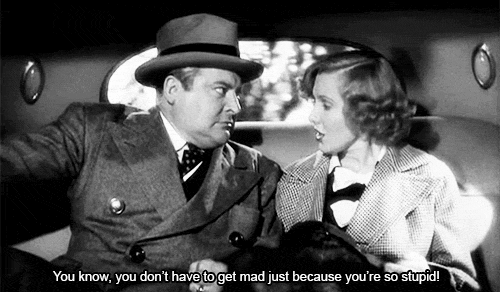Many interesting comparisons can be drawn from a side-by-side viewing of John Ford’s The Grapes of Wrath and Frank Capra’s Mr. Smith Goes to Washington. Although both are populist films extolling the virtues of the “everyman” in place of the cruel sensibilities of the corrupt powers-at-be, there are stark contrasts immediately identifiable within the two works.
Mr. Smith Goes to Washington is populated almost exclusively with moral archetypes: its namesake, Jefferson Smith, is an honorable boy scout in Abe Lincoln’s body, whereas his nemesis, Jim Taylor, stands fattened by greed and willing to do anything in pursuit of self-interest (including sending minions to slap children). In comparison, the characters of The Grapes of Wrath seem much more nuanced. As the hero, Tom Joad, enters the film, the audience immediately learns he has killed a man without apparent remorse; later, he will kill another.
Yet the situations of Jefferson Smith and the Joads are not entirely unlike each other, and I was reminded of a few key moments within Mr. Smith while watching The Grapes of Wrath. Here, two examples from the beginning and end of both films:
Resistance, then Realization
Early in both films, a strikingly similar scene unfolds. Met by the callous reality of “business as usual,” the protagonists revolt– only to be educated in the futility of their actions by those opposing them. This happens as Jefferson Smith realizes he has been duped by the press and launches into a vengeful rampage. Barreling into a bar filled with reporters, he sits down to an unpleasant exchange:
FLOOD
What do *you* know about laws--and
making laws--and what the people
need?
JEFFERSON
(tormentedly blurting)
I--I don't *pretend* to know!
DIZ
Then what are you doing in the Senate?
A similar situation happens to Muley, who introduces the narrative in The Grapes of Wrath. As his home is about to be destroyed by the “cat”, he brandishes a gun and shouts heated threats, only to be silenced.
MULEY
(grimly)
Have it your own way, son, but just
as sure as you touch my house with
that cat I'm gonna blow you plumb to
kingdom come.
DAVIS
(contemptuously)
You ain't gonna blow nobody nowhere.
First place, you'd get hung and you
know it. For another, it wouldn't be
two days before they'd have another
guy here to take my place.
Both men– Jefferson Smith and Muley– emerge defeated and downtrodden. But as Jefferson regains his unique energy to write a bill and take on the senate, Muley stays down: a haunting reminder of the brutal, unfeeling and faceless oppression that colors the film.
Trust the System
But another – perhaps more cheerful – similarity emerges toward the end of both films. Both the Joads and Jefferson Smith are physically and emotionally exhausted, plodding towards a goal becoming steadily more unrecognizable in a barrage of adversity. But in the midst of the chaos, Ford and Capra give the audience a symbol to latch onto: the federal government. Within Mr. Smith, this is seen in the Vice President, whose knowing looks and nods provide tacit support to Jefferson Smith. His chair represents the order of the senate, and the fundamental laws ordering senate conduct are what propel Smith’s cause to its eventual victory – despite the attempts of other senators to derail them in their own favor.
For the Joads, salvation comes in the form of a Department of Agriculture camp: a representation of the government in its best form, championed by Franklin D. Roosevelt. Indeed, the camp is government by the people, for the people. It offers a lasting light of optimism for both the Joads and for the audience.










 Arnold and Arthur from the film Easy Living (1937)
Arnold and Arthur from the film Easy Living (1937)


